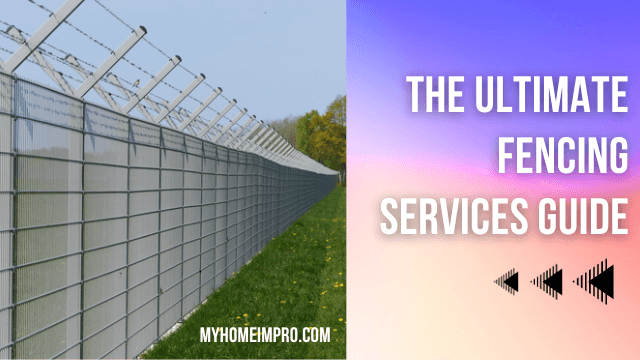If you’re after a fencing guide, we’ll be here to go into the world of fencing, from its critical role in delineating property boundaries to its aesthetic contributions to your home or business landscape.
This guide is designed to provide comprehensive information about different types of fences, materials, installation techniques, and maintenance tips.
Whether you’re a homeowner seeking privacy or a business looking to secure its premises, this guide will offer insights to help you make informed decisions about your fencing needs.
What is Fencing?
Table of Contents
Fencing is a structure designed to enclose an area, typically used for security or privacy purposes. It can also be used to enhance the appearance of a property by adding aesthetic value. Fences come in various designs, materials, and sizes, making them versatile for any property. A fence can define the boundaries of a private residence, commercial property, or agricultural land.
Types of Fences
Numerous fences are available, each with unique characteristics, applications, aesthetic appeal, and price range. Whether you’re in the market for a traditional wooden fence or exploring modern metal options, understanding these variations can help you choose the best fit for your property. Here are some common types of fences:
- Wooden fences – Wooden fences are popular due to their natural aesthetics and versatile styles. They can be cut, shaped into many designs, and painted in any color. However, they require regular maintenance to prevent decay and damage from insects or weather conditions.
- Vinyl fences – Vinyl fences, also known as PVC, are durable and require little maintenance. They come in various styles and colors, and unlike wood, they’re not susceptible to rot or pests. However, they can be more expensive than other fencing options.
- Metal fences – This category includes chain links, wrought iron, and aluminum fences. These fences are known for their durability and security. While chain-link fences are economical but offer little privacy, wrought iron and aluminum fences are more expensive but provide a higher aesthetic value.
- Composite fences – Composite fences are made from wood and plastic. They offer the look of wood but with less maintenance. These are a good choice for those who want a durable, eco-friendly option.
- Bamboo fences – Bamboo fences bring a landscape an exotic, natural look. They’re eco-friendly and durable, but like wooden fences, they require regular maintenance to keep their appealing look.
Understanding the various types of fences and their respective advantages and disadvantages will help you make an informed decision when choosing a fence for your property.
Choosing the Right Fencing Material
When selecting a fencing material, consider factors like durability, maintenance requirements, and cost. The climate in your area is also an important consideration, as certain materials may not withstand extreme weather conditions. Additionally, think about the level of security or privacy you need for your property. For example, if you want a high level of security, metal fences may be a better option than wooden ones.
Fence Installation
Installing a fence can be a DIY project or left to professionals. However, for the best results and longevity of your fence, hiring experienced fencing contractors is recommended. They have the necessary tools and expertise to ensure proper installation, no matter the type of fence you choose.
Before beginning any installation, ensure you have the necessary permits and approvals from your local authorities. Also, be aware of underground utility lines to avoid potential damage.
Fence Maintenance
Regardless of the material or style of the fence, regular maintenance is vital for its longevity and appealing look. This includes cleaning, repainting or staining, fixing damages, and clearing debris around the fence. Neglecting maintenance can weaken the fence, leading to costly repairs or replacement.
Additional Factors to Consider
- Purpose of the fence – The primary purpose of your fence will significantly influence your decision. Are you seeking privacy, security, or a decorative accent to enhance your property’s aesthetic appeal? Your answer to this question will guide your fence type and material choice.
- Budget – Your budget will play a large role in determining the type of fence you choose. Some materials, like wrought iron or vinyl, are more expensive than others. Make sure to consider both the initial cost of the fence and the long-term costs of maintenance and potential repairs.
- Property size – The size of your property can also impact your choice. Some fencing materials may be more suitable for larger properties, while others work best for smaller ones.
- Local regulations – Before installing a fence, check your local regulations. Some neighborhoods have restrictions regarding the type, height, and location of fences.
- Climate and terrain – Certain fences perform better in specific climates and terrains. For instance, wood might not be the best choice for areas with high moisture levels, as it is susceptible to rot.
- Installation process – Some fencing types are easier to install than others. If you plan to install the fence, consider choosing a type that doesn’t require specialized tools or techniques.
- Lifespan and maintenance – Consider the lifespan and maintenance requirements of each material. Some materials, like composite or metal, require little upkeep and have a long lifespan, while others, like wood, require regular maintenance but can offer a more traditional aesthetic appeal.
- Compatibility with the property – The fence should complement the design and architecture of your home or business. Consider the colors, materials, and styles that best match your property.
Why is Professional Installation Important?
While it may be tempting to save money by installing a fence yourself, there are many benefits to hiring professional fencing contractors. Here are some reasons why professional installation is important:
- Expertise and experience – Professional fencing contractors have the necessary knowledge and experience to install fences properly. They know the best techniques for each type of fence and can ensure that your fence is installed correctly and securely.
- Efficiency – Installing a fence can be time-consuming, especially for those without experience. Professionals have the necessary tools and resources to complete the installation efficiently.
- Avoid costly mistakes – Improperly installed fences can lead to costly repairs or replacements in the future. Professional installation minimizes the risk of these mistakes, saving you time and money in the long run.
- Permits and approvals – Professional fencing contractors are familiar with local regulations and can help you obtain necessary permits and approvals for your fence installation.
- Warranty – Many professional fencing companies, such as Stand Strong Fencing, offer warranties on their work, providing peace of mind for customers. If any issues arise with the fence, the company will take care of them.
Conclusion
Regarding fencing services, there are various materials and types to choose from. Consider your specific needs, budget, and property characteristics before deciding. And for the best results, always opt for professional installation.
With proper selection and installation, a fence can enhance your property’s functionality, security, and aesthetic appeal for years to come. So, take your time and do your research before making a final decision on the type of fence that will best suit your property.

